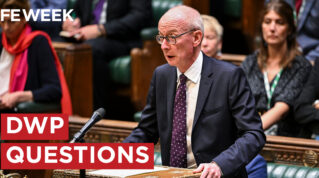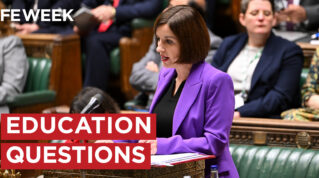Ministers are set to significantly increase the tax rate on the Immigration Skills Charge and enforce stricter English speaking rules on migrants, it was announced today.
A new levy is also on the cards for higher education providers’ income from international students with funds raised “to be reinvested into the higher education and skills system”.
The proposals were laid out in a government white paper that aims to “restore control” over the immigration system.
Prime minister Keir Starmer claimed this morning that his government “will end the chronic underinvestment in domestic skills that has hindered economic growth” to reduce reliance on migrant workers.
The white paper pointed out that England’s economy has been “distorted by perverse incentives to import workers rather than invest in our own skills”, going on to name sectors like engineering where “apprenticeships have almost halved while visas doubled”.
It added: “At a time when skills matter more than ever to the economy and people’s employment prospects, there has been a long-term lack of coordination or investment to deliver the skills and capabilities our economy needs. Alongside this, training by employers has fallen, and investment in adult education has been cut.”
The words come as the Department for Education plans to cut its adult skills fund budget by about 3.7 per cent in 2025-26.
Here are the key policies from today’s white paper that impact the skills sector:
Immigration Skills Charge to rise by 32%
The government will increase the tax employers have to pay to bring in workers from abroad by nearly a third.
The Home Office brought in the immigration skills charge (ISC) in April 2017 to “incentivise” the training of British workers and income raised would be directed towards programmes that “address skills gaps” in the UK workforce.
Receipts from the charge have exponentially grown every year and have brought in a more than £1.5 billion of funding.
The white paper said that the ISC has not been increased or “subject to a comprehensive policy review since its introduction”.
Labour therefore said it would therefore increase the tax by 32 per cent for the first time, to bring ISC rates in line with inflation.
Small businesses or charities will now have to pay £480, up from £364 for the first 12 months of hiring a migrant, and then £240 (originally £182) extra every additional six months.
Medium to large “sponsors” will now pay in £1,320 for the first year, up from £1,000, and £660 for the subsequent six months, up from £500.
“The immigration system must be linked to skills and training requirements here in the UK, so that no industry is allowed to rely solely on immigration to fill its skills shortages,” the paper said.
The white paper added that ISC funding will be used at the upcoming spending review to “support skills funding for priority sectors” that will upskill UK workers and “reduce reliance on migration in the medium term”.
A previous FE Week investigation found the government could not specify how it was meeting its pledge to reinvest the income from the tax into the upskilling programme.
It is not clear when the new ISC charging rate will come into force.
Stricter rules for language proficiency
People wanting to move to the UK will be required to speak a better level of English under new rules outlined in the white paper.
The new requirements will require skilled workers and dependants to have higher language levels if they wish to apply for a visa or settle in the country.
According to the whitepaper, cross government work will make it “easier” for people needing additional help to access classes, but those wishing to extend their stay in the country must also show “improvements over time”.
There was however no mention of ESOL (English for Speakers of Other Languages) teaching in the white paper.
It said: “Those who wish to build their lives in the UK need to learn to speak and understand English so they can integrate into life in this country by getting a job or improving their prospects at work, accessing and making good use of local services, becoming part of community life and contributing to society.”
Currently, skilled workers must have a B1, or ‘intermediate’, level of English to gain a visa. This requirement will be increased to B2, or’ upper-intermediate’ – the fourth of six levels used to measure a person’s language skills.
For the first time all adult dependants of workers and students will need to show level A1, the most basic level of proficiency, if they want to stay in the UK.
Anyone wishing to extend their visa must show they have progressed to A2, the second level, or to B2 if they wish to settle permanently.
Citing 2021 census data, the government argues good language skills are linked to people being in full time and higher skilled worked.
The paper argues that 70 per cent of people with proficient English were employer or self-employed, compared to 50 per cent for those who couldn’t speak the language well or at all.
Communication is “essential” to performing civic duties as well as social connections, while lack of communication skills risks isolation and “poor integration”, the paper adds.
International student levy
Higher education providers could be made to pay a new international student levy to “share the benefits” of the estimated £20.65 billion generated by overseas students for UK universities.
The white paper said there has been a “rapid increase” in sponsored study visas at lower-ranked education institutions, driven by a “rapid increase in international students applying for master’s degrees in the UK”. UK visas for universities globally ranked between 601 and 1,200 increased by 49 per cent between 2021 and 2023; whilst visas for top 100 universities fell by 7 per cent over the same period, according to the document.
Meanwhile, the “stay rate of migrants” – the proportion who choose to, and have legally been able to, remain in the UK over the long-term – has shot up. More than half of students arriving in 2020 still held leave after three years, the highest level on record, the white paper said.
There is little detail on who will pay the proposed levy and how much it will raise. Funds from the proposed levy, which will be set out in more detail in the Autumn budget later this year, will be “reinvested into the higher education and skills system.”
This comes alongside stronger rules for institutions sponsoring student visas in a bid to “prevent misuse”.
Thresholds that sponsoring institutions need to meet around course enrolment and completion rates will increase.
Known as the Basic Compliance Assessment (BCA), providers currently have to evidence a 90 per cent course enrolment rate and 85 per cent course completion rate. Those thresholds will rise to 95 per cent and 90 per cent respectively.
“It is clear the current thresholds are too lenient and have left the route open to abuse and exploitation,” the white paper said.
Sponsors will also be publicly rated along a new red, amber, green system according to their BCA compliance.
Failure to comply with at least one BCA measure can result in a provider’s sponsorship license being revoked.
Mandatory workforce strategies
The white paper added little to Labour’s general election manifesto pledge to require sectors with high levels of foreign workers to produce domestic workforce strategies.
A new quango, the Labour Market Evidence Group (LME Group), linked to Skills England, will set out which sectors will be required to produce such plans. Health and social care and construction are the only two sectors currently flagged.
Employers in in-scope sectors will be “expected to comply” with the workforce strategies, which the white paper states will set out “steps to be taken on skills, training, and broader conditions” to reduce reliance on overseas workers by training up domestic workers.
We don’t know who will take the lead on developing these plans, when they will come into force, or how they will link to the government’s skills reforms, such as the growth and skills levy and adult skills fund.
Who cares?
Overseas recruitment for social care visas will end in 2028.
The system has been open to abuse and worker exploitation, according to the white paper, with employers failing to do enough to train UK workers.
Concerns over poor pay and conditions in the sector are set to be tackled by new “fair pay agreements”, but the white paper falls short of detailing any new skills or training interventions.
An FE Week investigation last year found hundreds of training providers had abandoned offering apprenticeships in adult care, and some specialist providers had even gone bust.
Historically low funding rates for the apprenticeships were in part to blame, but chronic workforce shortages, low pay and high staff turnover also made the programmes unviable.
Alongside, skilled worker visas will be reserved for degree-level and higher-earning occupations.
Since 2020, skilled worker visas were available in certain occupations with skills requirements at level 3, or A-level standard. It was level 6 (degree-level) before that.
The government said the number of visas has nearly doubled since the threshold was lowered, with a “far higher proportion of lower-skilled workers”.















Your thoughts